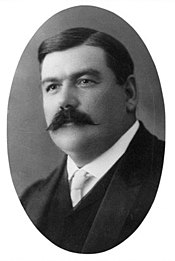Newton James Moore
|
Major-General Sir Newton Moore KCMG |
|
|---|---|
 |
|
| 8th Premier of Western Australia | |
|
In office 7 May 1906 – 16 September 1910 |
|
| Preceded by | Sir Cornthwaite Rason |
| Succeeded by | Frank Wilson |
| Constituency | Bunbury |
| Member of the United Kingdom Parliament for St George's, Hanover Square |
|
|
In office 4 October 1918 – 14 December 1918 |
|
| Preceded by | Sir George Reid |
| Succeeded by | Walter Hume Long |
| Member of the United Kingdom Parliament for Islington North |
|
|
In office 14 December 1918 – 6 December 1923 |
|
| Preceded by | Sir George Touche |
| Succeeded by | William Henry Cowan |
| Member of the United Kingdom Parliament for Richmond (Surrey) |
|
|
In office 29 October 1924 – 13 April 1932 |
|
| Preceded by | Harry Thomas Alfred Becker |
| Succeeded by | Sir William Ray |
| Personal details | |
| Born |
17 May 1870 Fremantle, Western Australia |
| Died | 28 October 1936 (aged 66) London, England |
| Nationality | Australian |
| Political party | Unaligned (Western Australia) Conservative (United Kingdom) |
| Spouse(s) | Isabella Lowrie |
| Profession | Surveyor |
Major-General Sir Newton James Moore KCMG (17 May 1870 – 28 October 1936), was the eighth Premier of Western Australia and a member of the House of Commons of the United Kingdom from 1918 to 1932.
Newton Moore was born in Fremantle, Western Australia, son of James Moore, auctioneer and later mayor of Bunbury, and Elizabeth Dawson, schoolteacher. He was educated at Arthur Street Primary School in Bunbury before attending Prince Alfred College in Adelaide, South Australia. In 1886, he was apprenticed as a surveyor to Alexander Forrest. After qualifying in 1894, he worked as a contract surveyor in and around the Bunbury area. In April 1898 he married Isabella Lowrie, sister of William Lowrie.
In 1899 Moore was elected to the Bunbury Municipal Council, and was Mayor of Bunbury from 1900 to 1904. In 1903 he was also a member of the Royal Commission on Forestry, and during 1904 and 1905 he was President of the Municipal Association of Western Australia.
Moore was also involved in the Western Australian militia, commencing a long career as a private with the BRV (Bunbury Rifle Volunteers) in 1894. By 1900 he had risen to captain and was instrumental in assisting in the formation of the BVR Mounted Infantry Section, which was later incorporated into the WAMI (Western Australian Mounted Infantry). After the Commonwealth reorganisation of 1903, the unit was renamed the 18th (WAMI) Australian Light Horse. Moore served as acting commander until 1908, when he was promoted to lieutenant colonel and officially appointed the commanding officer. In August 1908, Moore was appointed commanding officer of the 5th Military District Intelligence Section, where he remained until March 1914.
...
Wikipedia
